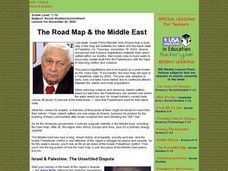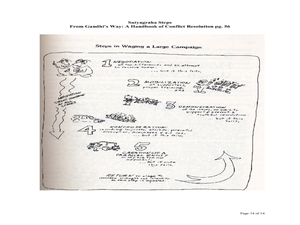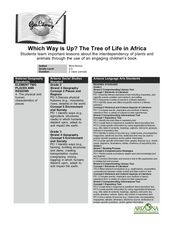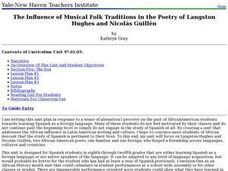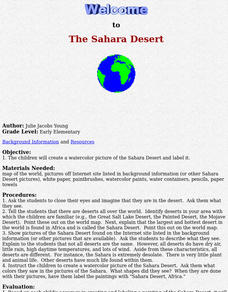Curated OER
Black American Musicans: Precursors of Jazz
Students trace the course of Black music from the 1900's to the beginning of the jazz age. They realize that when education is defined as enlightened training for a place in society and for individual personal development, it was highly...
Curated OER
World War II Webquest
Tenth graders work with a partner to locate and follow the directions of a webquest of their choice. Using the internet, they research their topic in depth and write a paper on their findings. They are assessed by the criteria on the...
Curated OER
Multiple Perspectives on the Korean War
Students interpret historical evidence presented in primary and secondary resources. In this Korean War activity, students examine and analyze primary sources regarding U.S. involvement in the Korean War.
Curated OER
Globe Game
Students are arranged into groups and are given a map or globe. Students select a location on the map. Students as yes and no questions to guess the specific place that was chosen.
Curated OER
Exploring Maps: Lesson 2 Guide: Navigation
Students explore and examine how maps have been used in navigation. They research how travelers collected observations to keep track of their positions and plotted information on maps. Each student then makes a Mercator projection...
Curated OER
The Road Map & the Middle East
Will walls help? Read to learn how Prime Minister Ariel Sharon proposes to build walls around Isreal in hopes of isolation from Palestine. Complete an online Webquest, analyze maps, listen to audio clips, answer discussion questions, and...
Curated OER
Sanitation and Disease Challenge
Students explore global health issues related to water and sanitation. In this Peace Corps lesson, students participate in an online game that requires them to examine how hygiene education, tapping springs, constructing wells, and...
Curated OER
African Architecture
Seventh graders investigate cultural influences on architecture in Africa south of the Sahara. They compare the architecture to that in North America, Europe, Russia, and North Africa, Asia, and South America.
Curated OER
Kente Cloths
Second graders create examples of Kente cloths using paper, markers, and paints in this multi-cultural Art lesson for the second grade. The two part lesson includes an introduction of Kente Cloth designs and can be accomplished in one day.
Curated OER
Gandhi's Non-violent Revolutions: Examining Tools to Make Non-violent
Students analyze Gandhi's philosophy of nonviolent social change. In this nonviolence and social change lesson, students research a leader from the attached list who practiced nonviolent social change. Students write their own poem...
Curated OER
Which Way is Up? The Tree of Life in Africa
Students read a book titled This is the Tree about a baobab tree and draw a picture and label the tree. In this tree lesson plan, students also write a paragraph explaining why they drew that tree.
Curated OER
The Influence of Musical Folk Traditions in the Poetry of Langston Hughes and Nicolás Guillén
Students listen and explore how African-American culture relates to learning Spanish as a foreign language. Poetry, music, and history are utilized while learning about Langston Hughes and Nicolas Guillen.
Peace Corps
Weather and Water in Ghana
Students investigate the climate of their region. Students research statistics and conduct interviews. Students take a virtual tour of Ghana and discuss its climate. Students consider water conservation and the role it plays in both...
Curated OER
Ivory Wars
Students examine the controversy surrounding African trade. In this geography lesson, students research the killing of elephants for ivory. Students collaborate to report on the history of the ivory trade and its modern-day developments....
Peace Corps
Cuisine and Etiquette
Students identify the main food in the different cultures they have examined. In groups, they compare and contrast their expected table manners to the ones in Sierra Leone, Uganda and Zambia. Using this list of behaviors, they identify...
Curated OER
Culture Is Like an Iceberg
Students examine features of culture to determine which are visible and which are invisible, and how the invisible affect the visible. They look at both their outline drawing of the iceberg and their Features of Culture worksheet and...
Peace Corps
Features of Culture
Young scholars enumerate features of their own culture and evaluate how those features have influenced their lives. They explain that many differences are related to culture-beliefs and ways of living that are handed down from one...
Curated OER
Cultural and Historical Meaning: Little Johnny Brown
Learners perform a folk dance and discuss its cultural and historical meanings. They review the dance and perform it, beginning with four individuals who dance with confidence right from the start.
Curated OER
Comparing Countries
Students compare facts about different countries. In this comparing lesson, students collect information about the US and another country and compare them. Students locate countries on the map and make a hypothesis about the lives of...
Curated OER
The Ottoman Empire
Students recognize that the Ottoman Empire was at its grandest during the reign of Suleyman the Magnificent. They use a map to draw in the extent of and the details of the Ottoman Empire during hie reign. In addition, they prove the...
Curated OER
Games and Toys Reflect Resources
Students will demonstrate their understanding that different games reflect local resources by creating a type of ball.
Curated OER
The Sahara Desert
The children will create a watercolor picture of the Sahara Desert and label it.
Curated OER
Ancient Egypt
Young scholars use the internet to gather information on Ancient Egypt. Using this information, they create their own name cartouche using markers and construction paper. They also make pyramid cutouts and draw pictures of the Great Sphinx.
Curated OER
Words in the News: New Zambezi Bridge
Students discuss what they know about the country of Africa. They examine the transportation infrastructure on the continent. They practice using new vocabulary words. They also read articles and answer questions.





